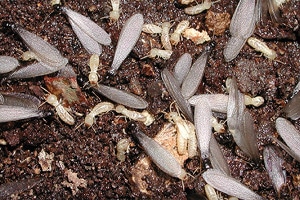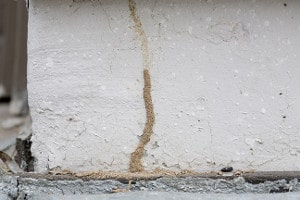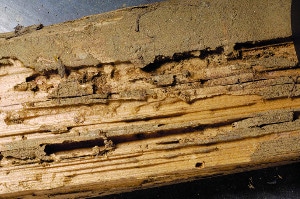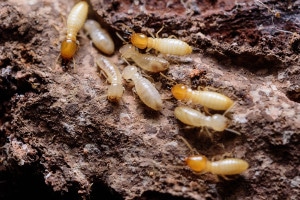![]() Why Termite Prevention is Important!
Why Termite Prevention is Important!
Termite prevention is a great topic for home owners in Des Moines, Urbandale, Johnston and central Iowa. Termites cause as much as 5 billion dollars worth of damage property damage each year in the United States, and most home owners insurance does not cover termite damage. In Des Moines and central Iowa eastern subterranean termites are active from late March to late October and generally cover an area of about an acre per termite colony.
What To Look For
Termite colonies spend the majority of their time underground foraging for cellulose like old tree stumps, fire wood and the 2×4 structures that support your home. Termites are cryptobiotic meaning they hid very well and are often not discovered until a remodel occurs. Worker termites dry out easily and are bright white, these worker termites build mud tubes to provide them with continued moisture and hide them from predators like birds and other insects. Images and some content provided by Dow Agoscience
 SWARMING
SWARMING
Termites often swarm in warmer weather and after a rain shower to start new colonies. The swarming event can be brief, so even if you do not see flying termites, you are likely to see the discarded wings around window sills, doors, heating vents, bathtubs and sinks after a swarm takes place. Termite swarmers use their wings to move away from their original colony. Their wings break off and they pair up and find locations with a wood source where the male and female can begin a new colony. Whether you see the swarm or think there might have been one,call a professional immediately.

MUD TUBES
Foraging worker termites, the ones that eat wood to feed the rest of the colony, must stay in moist conditions and away from natural enemies like ants. To get across barriers between the soil and the wood above, termites construct small, meandering “mud” tubes from moist soil and excrement. The tubes are about the diameter of a pencil, though they can become wider. Tubes can be seen on foundation walls or inside walls, on plumbing pipes and spanning crawl spaces between the ground and the sub-floor. These termite highways are a sure sign termites are or have been in the home.

DAMAGING WOOD
Termites eat wood from the inside out along the grain, so damage often isn’t visible until it becomes significant. Termite inspectors often will tap to listen for hollow-sounding wall studs, baseboards and floors. If the wood gives way, it may reveal a hollowed-out honeycomb pattern. The wood also will include some “mud” similar to mud tubes, plus live termites.
Formosan termites are an especially robust, destructive species with large colonies. Walls of infested buildings may contain carton nests that hold enough moisture to allow the colony to live entirely above ground, sometimes causing bulging walls.
 LIVE INSECTS
LIVE INSECTS
When building or remodeling in your home, keep an eye out for soft-bodied, light-colored insects about the size of a grain of rice. Termites avoid light, so they are seldom visible in open areas.
Where to Look
Sill Plates
Sill plates in the basement of a home offer a great area to inspect for termites. Termites often enter a home though cracks in the buildings foundation that are as small as 1/16th of an inch. Once inside termites often move up and begin attacking the sill plates of a home. Their distinctive mud tubes will give away the presence of termites in a home. Us a flashlight and a screw driver to inspect your homes sill plates for termite activity.
Garages and Out Buildings
Garages and out buildings are a common place for termites to attack and are often easy to find if the structure is unfinished. again use a flash light and inspect behind and underneath stored items for the tell tail mud tubes. Be sure not to store firewood, old boards and boxes on the floor as these can be inviting food sources for termites.
Stumps and Stored Firewood
Old stumps and firewood are a great source of food for termites in Des Moines. Be sure to store firewood off of the ground and away from the home.
For more information about termite control Des Moines, Termite Control Ankeny, Termite Control West Des Moines or Termite Control Contact Us
